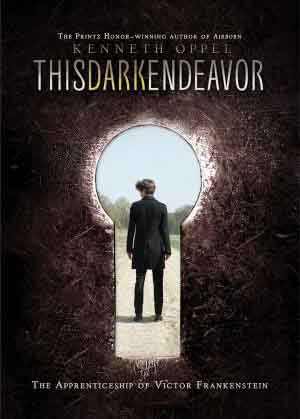Anyone who reads this blog knows that I have a deep passion for pretty much anything even remotely related to Mary Shelley's classic, Frankenstein: The Modern Prometheus. I have reviewed a few sequels to the book, but This Dark Endeavor goes in a completely new direction. Titled a prequel, it's really more of a reimagining of the story of a mad scientist and his creation. This, this right here is how you do "reboots" or "remakes", you come at the subject from a different view point and try to see how it can be reinvented, examined from a new perspective. Not only that, Oppel's descriptive, florid writing isn't overbearing, instead bringing a level of intelligence I've come to expect in anything that wants to try and stake a claim on the Frankenstein legacy.
In Oppel's version, Victor is born with a twin brother, Konrad. The two are identical and inseparable, and along with their cousin Elizabeth and good friend Henry Clerval, this band of intelligent young people spend their days in a lap of luxury. Henry is an aspiring writer (though he knows that it will never amount to much if he wishes to truly support himself) and writes plays that his friends perform. Victor is an arrogant, rash young man, setting himself clearly apart from his twin, who is not only the elder, but the more charismatic, intelligent, and generally well liked of the two. One might think that this would lead to enmity between the brothers, but in truth they work together like two sides of the same coin. Elizabeth, the only female of the group, and the main female character of the book, keeps up with the boys with little issue, able to add in their debates and even taking part in their learning as a part of the Frankenstein's liberal household.
A thirst for knowledge runs deeply in the group, and they stumble upon a hidden library in the house; a Dark Library, full of occult knowledge and alchemy spells. Victor and Konrad's father discover the group in the library, and ban them from ever entering it again, for alchemy is illegal in Geneva and he would not have his children mixed up in something as sodden as "magic". Victor's interest is piqued, but he is content to leave well enough alone until Konrad mysteriously falls ill. He continues to worsen, even as treatment after treatment is given to him. Victor finds that the only solution may be an Elixir of Life, described in one of Agrippa's books (Heinrich Cornelius Agrippa, a German magician and alchemist). But the text is written in code, and in order to break it, Victor, Elizabeth, and Henry are force to seek out one who is familiar with the craft of alchemy. This search leads them to Julius Polidori, undoubtedly named for Lord Byron's doctor, who was a well-known companion of Bryon, Percy Shelley, and Mary Shelley.
The book follows Victor's adventures in collecting the three items needed to create the elixir - and in the discovery of alchemy, Victor learns much, much more about himself that he ever thought he would. Not only does he have a gift for crafting alchemical potions, but he comes to learn that he and his brother are at odds over the subject of Elizabeth's heart. I personally enjoyed seeing the usual young adult love triangle told from the perspective of one of the suitors; it was also good that the romance did not make up the bulk of the novel. The true focus of the book is on the relationship between Konrad and Victor. Its easy to see where the sequel, Such Wicked Intent (due out in August of this year), is going to head, but I loved that the book played with similar elements as that of the British stage play version of Frankenstein, put on by the National Theater. It's the thought that Victor and his Creation are two sides of the same coin, complementing and completing each other in a richer way than any romance or relationship could.
Homages to the original novel abound throughout the book, popping up with delight for the reader who can spot them. It certainly lays out where the story can go, but I trust Oppel to make it quite a journey to get to the end - for in the telling of any story, it's more about the obstacles that the protagonist must pass through in order to reach their ending rather than the ending itself. For a young adult novel, this book was gripping, and I had it finished within days of finally locating it. If you're looking for a great, quick read, I highly recommend this book.


No comments:
Post a Comment